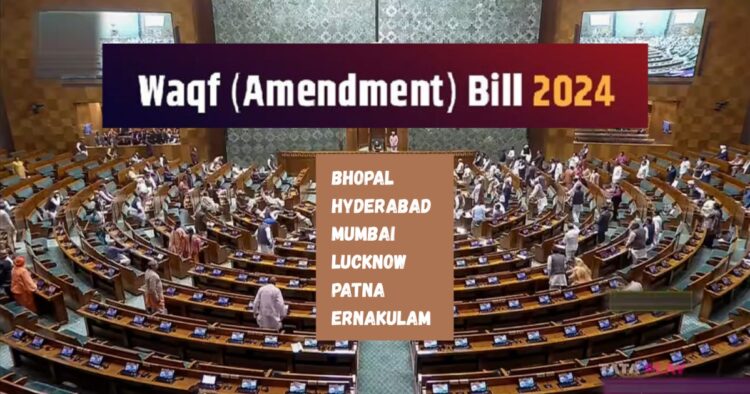- Waqf properties face massive encroachment due to mismanagement.
- Illegal occupations reported in multiple states, including by Muslims.
- Over 58,890 encroachment cases highlight urgent need for reforms.
Encroachment on Waqf properties has been a long-standing issue in India, with repeated complaints and grievances surfacing over the years. However, a notable pattern in these complaints suggests that mismanagement and inaction by State and Union Territory (UT) Waqf Boards, which are primarily administered by Muslim members, have played a significant role in these encroachments.
According to multiple reports, many cases of encroachment have been linked to internal disputes within the Muslim community itself. This raises serious concerns about governance, transparency, and the proper utilization of Waqf properties, which are meant for religious and charitable purposes.
Alarming Cases of Encroachment Across States
Several states have reported large-scale illegal occupation of Waqf land.
In Bhopal, a Waqf Complex was illegally built on government land. Out of 125 registered graveyards, 101 have mysteriously disappeared, and private individuals have occupied the land. Additionally, in Sarai Sikandari, a 24,450 sq. ft. Waqf property has seen 1,800 sq. ft. taken over by a local politician.
In Hyderabad, 765 notices were issued to encroachers in 2021 alone. The Telangana Waqf Board, one of the richest in India, owns assets worth ₹15 lakh crore, but shockingly, 75% of its land is encroached upon. AIMIM leader Akbaruddin Owaisi has also admitted that 82% of Hyderabad’s Waqf land has been grabbed by private individuals.
In Mumbai, more than 60% of Maharashtra’s Waqf land has been illegally occupied. A striking example is the Lal Shah Baba Dargah in Parel, which originally spanned 72 acres but is now surrounded by residential towers built on Waqf land.
In Lucknow, the Uttar Pradesh government found that 78% of the land claimed by the Waqf Board was actually government-owned, with no legal Waqf rights. A 1989 order that wrongly registered uncultivable land as Waqf property was revoked.
In Patna, the Bihar Sunni Waqf Board issued a notice claiming ownership of land in Govindpur, a Hindu-majority village in Fatuha, affecting seven Hindu households.
In Kerala’s Ernakulam district, around 600 Christian families strongly opposed the Waqf Board’s claim over their land in Cherai and Munambam. The families argue that they have lived there for generations, and the claim is unjustified.
A Systemic Issue Requiring Urgent Reforms
India has 32 Waqf Boards across 23 states and 7 Union Territories, with separate Shia and Sunni Waqf Boards in Bihar and Uttar Pradesh. According to the Waqf Assets Management System of India (WAMSI) portal, there are 8.72 lakh registered Waqf properties spanning 37.39 lakh acres. However, only 1,088 properties have registered Waqf deeds, and just 9,279 have Ownership Rights Establishing (ORE) documents.
Encroachment remains a widespread challenge, with 58,890 instances recorded on WAMSI. Additionally, 31,999 litigation cases related to Waqf properties are pending before Waqf Tribunals and Boards. Among these, nearly 9,000 cases involve Muslim parties, proving that even within the community, there are issues of mismanagement and disputes.
Furthermore, out of the total litigation cases, 16,140 cases are related to encroachments, and 3,165 of these involve Muslim encroachers. This highlights that the problem is not confined to any single community but is a broader governance issue requiring systemic reforms.
The legal disputes surrounding Waqf properties fall under five categories: Miscellaneous Petitions, Encroachment, Alienation, Enquiry Proceedings, and Assessment Appeals. Given the scale of mismanagement, many experts believe that urgent reforms are needed to ensure better governance, transparency, and proper utilization of Waqf properties.
ALSO READ: “Waqf Bill Moves to Rajya Sabha: NDA’s Strong Numbers Leave INDI Alliance Struggling”

















Comments